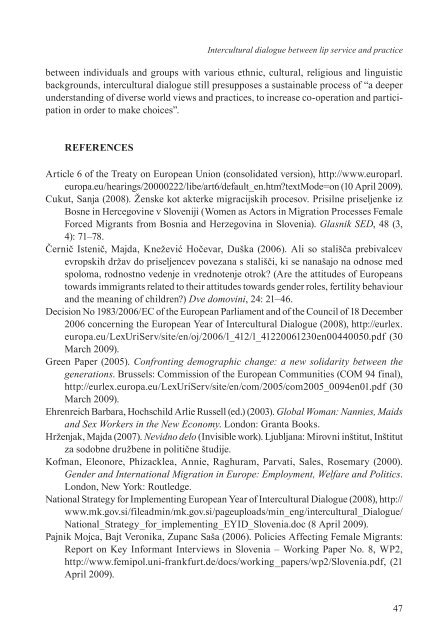30 • 2009 - Dve domovini / Two Homelands - ZRC SAZU
30 • 2009 - Dve domovini / Two Homelands - ZRC SAZU
30 • 2009 - Dve domovini / Two Homelands - ZRC SAZU
You also want an ePaper? Increase the reach of your titles
YUMPU automatically turns print PDFs into web optimized ePapers that Google loves.
Intercultural dialogue between lip service and practice<br />
between individuals and groups with various ethnic, cultural, religious and linguistic<br />
backgrounds, intercultural dialogue still presupposes a sustainable process of “a deeper<br />
understanding of diverse world views and practices, to increase co-operation and participation<br />
in order to make choices”.<br />
REFERENCES<br />
Article 6 of the Treaty on European Union (consolidated version), http://www.europarl.<br />
europa.eu/hearings/20000222/libe/art6/default_en.htm?textMode=on (10 April <strong>2009</strong>).<br />
Cukut, Sanja (2008). Ženske kot akterke migracijskih procesov. Prisilne priseljenke iz<br />
Bosne in Hercegovine v Sloveniji (Women as Actors in Migration Processes Female<br />
Forced Migrants from Bosnia and Herzegovina in Slovenia). Glasnik SED, 48 (3,<br />
4): 71–78.<br />
Černič Istenič, Majda, Knežević Hočevar, Duška (2006). Ali so stališča prebivalcev<br />
evropskih držav do priseljencev povezana s stališči, ki se nanašajo na odnose med<br />
spoloma, rodnostno vedenje in vrednotenje otrok? (Are the attitudes of Europeans<br />
towards immigrants related to their attitudes towards gender roles, fertility behaviour<br />
and the meaning of children?) <strong>Dve</strong> <strong>domovini</strong>, 24: 21–46.<br />
Decision No 1983/2006/EC of the European Parliament and of the Council of 18 December<br />
2006 concerning the European Year of Intercultural Dialogue (2008), http://eurlex.<br />
europa.eu/LexUriServ/site/en/oj/2006/l_412/l_412200612<strong>30</strong>en00440050.pdf (<strong>30</strong><br />
March <strong>2009</strong>).<br />
Green Paper (2005). Confronting demographic change: a new solidarity between the<br />
generations. Brussels: Commission of the European Communities (COM 94 final),<br />
http://eurlex.europa.eu/LexUriServ/site/en/com/2005/com2005_0094en01.pdf (<strong>30</strong><br />
March <strong>2009</strong>).<br />
Ehrenreich Barbara, Hochschild Arlie Russell (ed.) (2003). Global Woman: Nannies, Maids<br />
and Sex Workers in the New Economy. London: Granta Books.<br />
Hrženjak, Majda (2007). Nevidno delo (Invisible work). Ljubljana: Mirovni inštitut, Inštitut<br />
za sodobne družbene in politične študije.<br />
Kofman, Eleonore, Phizacklea, Annie, Raghuram, Parvati, Sales, Rosemary (2000).<br />
Gender and International Migration in Europe: Employment, Welfare and Politics.<br />
London, New York: Routledge.<br />
National Strategy for Implementing European Year of Intercultural Dialogue (2008), http://<br />
www.mk.gov.si/fileadmin/mk.gov.si/pageuploads/min_eng/intercultural_Dialogue/<br />
National_Strategy_for_implementing_EYID_Slovenia.doc (8 April <strong>2009</strong>).<br />
Pajnik Mojca, Bajt Veronika, Zupanc Saša (2006). Policies Affecting Female Migrants:<br />
Report on Key Informant Interviews in Slovenia – Working Paper No. 8, WP2,<br />
http://www.femipol.uni-frankfurt.de/docs/working_papers/wp2/Slovenia.pdf, (21<br />
April <strong>2009</strong>).<br />
47

















